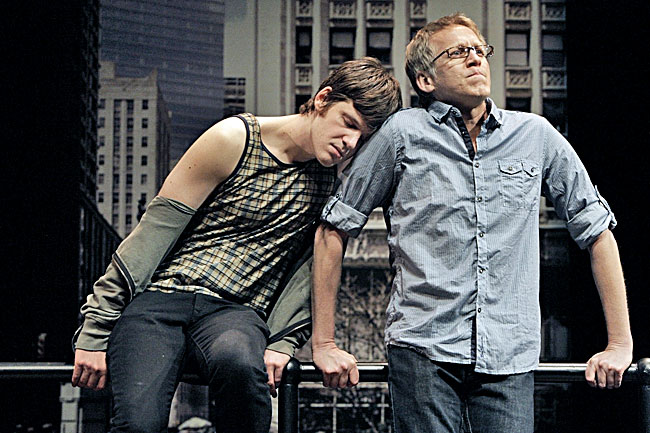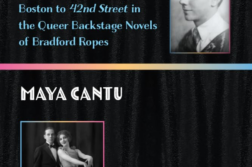The Intelligent Homosexual’s Guide to Capitalism and Socialism with a Key to the Scriptures
Written by Tony Kushner
Directed by Michael Greif
The Public Theater, New York
BY ITS VERY TITLE—The Intelligent Homosexual’s Guide to Capitalism and Socialism with a Key to the Scriptures—we know that Tony Kushner, wunderkind extraordinaire, is presenting a play dense with ideas and extravagant language. Kushner does not shy away from these charges, which have also been applied to his outsize masterpiece Angels in America. Indeed, not only is the title specifically Shavian—a reference to the Irish playwright’s essay “The Intelligent Woman’s Guide to Socialism and Capitalism”—but it announces that it will be dealing with “issues” à la Ibsen when he took on class privilege or women’s rights.
Start with the essential impetus of the plot: retired longshoreman Gus Marcantonio, an autodidact and Marxist to the core, is hell-bent on committing suicide and leaving his three adult children the handsome proceeds from the sale of the family home in the newly gentrified Carroll Gardens, Brooklyn. Already, we are in the territory of great dramatic literature: Shakespeare’s King Lear, with the patriarch dividing his property and demanding the fealty of his offspring; Chekhov’s The Cherry Orchard, on the sale of a beloved family estate to a stranger; both Arthur Miller’s A View from the Bridge and Elia Kazan and Budd Schulberg’s On the Waterfront, in which a working-class man is married to old-world family; and Miller’s Death of a Salesman, about the tragedy of a man facing a failed life. Attention must be paid.
But while these echoes persist, they do not overwhelm the marvelously specific and human family history that Kushner creates. The three Marcantonio children gather at the family homestead along with their respective partners (current or ex) to dissuade the old man from another suicide attempt, the first one having failed horribly a year earlier. They also hope to judge the veracity of his claim that he’s experiencing early symptoms of Alzheimer’s.
 The older son, Pill (for Pier Luigi), is a gay history teacher who has been working on his doctoral dissertation for thirty years. Paul, Pill’s exasperated African-American partner, a theologian, is on to his lover’s year-long addiction to buying sex from a young hustler, Eli, who has an Ivy League degree. Gus’s adored daughter Empty (for Maria The-resa, or M.T.), a labor lawyer and former nurse, comes in with a very pregnant partner trailing behind her, Maeve, as well as an ex-husband, Adam, also a lawyer, who conveniently lives in the downstairs garden apartment turned into a sad bachelor pad. Last is V (for Vito), the youngest of the children and the one least in thrall to his father’s left-wing politics. V is himself distinctly blue-collar, a carpenter with a hip Korean–American wife Sooze. He’s rather embarrassed for having not merely donated his seed for Empty and Mauve’s child, but for having taken the usual route to getting Maeve pregnant. V has neither a Hegelian vocabulary nor a taste for its dialectics, and stands apart from his progressive sister and gay brother, who can engage in the sorts of high-flown argument that must have made the dinner table of their youth a regular politico-intellectual slugfest.
The older son, Pill (for Pier Luigi), is a gay history teacher who has been working on his doctoral dissertation for thirty years. Paul, Pill’s exasperated African-American partner, a theologian, is on to his lover’s year-long addiction to buying sex from a young hustler, Eli, who has an Ivy League degree. Gus’s adored daughter Empty (for Maria The-resa, or M.T.), a labor lawyer and former nurse, comes in with a very pregnant partner trailing behind her, Maeve, as well as an ex-husband, Adam, also a lawyer, who conveniently lives in the downstairs garden apartment turned into a sad bachelor pad. Last is V (for Vito), the youngest of the children and the one least in thrall to his father’s left-wing politics. V is himself distinctly blue-collar, a carpenter with a hip Korean–American wife Sooze. He’s rather embarrassed for having not merely donated his seed for Empty and Mauve’s child, but for having taken the usual route to getting Maeve pregnant. V has neither a Hegelian vocabulary nor a taste for its dialectics, and stands apart from his progressive sister and gay brother, who can engage in the sorts of high-flown argument that must have made the dinner table of their youth a regular politico-intellectual slugfest.
In gathering at their father’s hearth, the three children—with dry input from their Aunt Clio, Gus’s sister, a former nun and rueful Maoist—seek to build consensus over father’s condition and their response to it: is it Alzheimer’s or is he faking (an allusion to Hamlet’s feigned madness at Elsinore)? In any case, what is to be done? Have the old man institutionalized? To what lengths should they go to prevent Gus from enacting the suicide he seems determined to commit? What has made his life a “prison” from which only death offers an escape?
No summary of the plot can adequately convey the verbal pyrotechnics demanded of the cast; all of the lead actors bring a sense of lived experience and immediacy to their roles. Yet Kushner’s sometimes hectoring diatribes threaten to undermine the emotional core of the main dramatic situation. When the siblings echo or dispute their father’s Marxist tropes, or when Gus himself dredges up the glorious placard-waving past, we come perilously close to humorless agitprop. On the other hand, when Gus reveals the price paid for his last hurrah, the achievement of a Guaranteed Annual Income for union members—but only those with seniority—he movingly conveys the conflict between personal ethics and political principles. Gus’s sense of having betrayed the one for the other, and in the process divided the union membership, lends psychological heft to the patriarch’s present unraveling.
In a play teeming with ideas and punctuated with a particular gay gallows humor—on this score, Stephen Spinella as Pill delivers acid drollery with the same slightly embittered ennui he displayed as Prior Walter in the original 1993 Angels—it is unfortunate that Kushner doesn’t trust the quiet moments as much as he should. Several powerful and thoughtful scenes, especially between Gus and each of his three children, deliver the emotional goods. Steven Pasquale, so spot-on as the adorable dumb lug fireman on cable TV’s Rescue Me, here builds a self-effacing characterization in the early scenes until he stands toe-to-toe with Michael Christopher’s Gus and reveals the essential neediness of the bypassed son waiting for his father’s crumbs of attention. Empty is asked by Gus to make a Hobson’s choice—perhaps a distant echo of Lear’s demand of fealty from his favored daughter, Cordelia. And in a quite moving scene toward play’s end, Pill admits to Gus—who once denounced his son’s homosexuality as “bourgeois corruption”—his sexual betrayal of Paul through a year of paid hustler sex with $30,000 borrowed from his sister, Empty, and meant for a quite different purpose.
It is easy to judge Kushner, like Tom Stoppard, as too ostentatiously learned. Relatively arcane references, whether to the Epistles of Horace or to obscure theological schools of philosophy, litter the dialogue and give the play a show-offy literacy that can be maddening. In addition, several scenes of family dysfunction with overlapping arguments among multiple characters present the head-turning choice of deciding whose dialogue to focus on, only to find that it is well-nigh impossible to hear anything with sufficient clarity anyway. These scenes become background noise, like a Robert Altman movie played at high speed—yet they also convey the operatic emotional pitch at which much of the play is meant to be tuned. Perhaps ironically, it is Paul, the black odd-man-out, who delivers a number of whiplashing arias, volcanoes of linguistic precision that cut through Pill’s and the family’s various delusions.
Without doubt, The Intelligent Homosexual’s Guide is worth the investment of three and a half hours. Hold on tight. It takes us to places we haven’t really been before: into the heart of an American radical whose world and faith in revolution are crumbling, and whose grown “red-diaper” babies, each bearing the burden of the past and beholden to the old man—for better and worse—simply don’t wish to stick around and watch his demise: the end of a dream.






